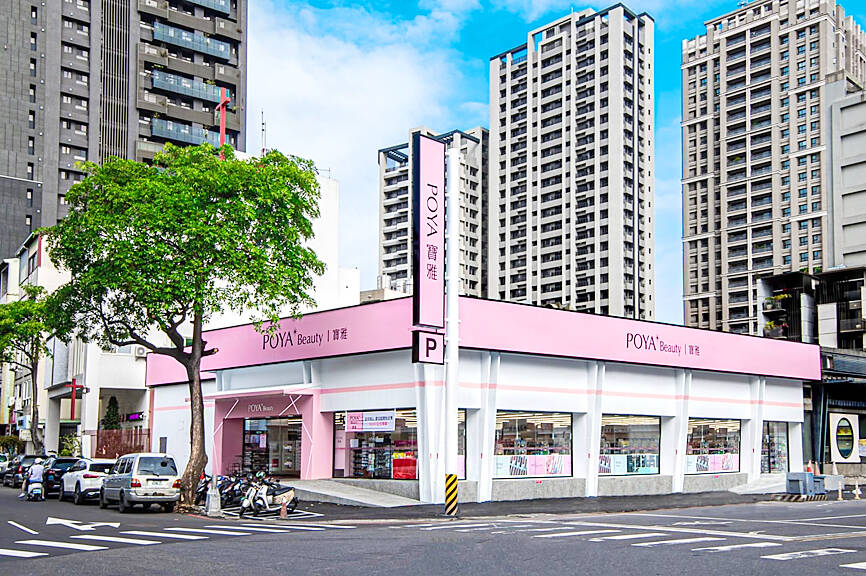Beauty and daily merchandise retailer Poya International Co (寶雅國際) yesterday reported better-than-expected net income in the first quarter, as revenue and profit margins improved significantly from a year earlier.
The company posted net profit of NT$784.59 million (US$24.17 million) for the January-to-March quarter, up 11.84 percent from NT$701.52 million a year earlier, it said in a regulatory filing.
That translated into earnings per share of NT$7.48, the highest for a single quarter in the company’s history and up from NT$6.71 the previous year.

Photo courtesy of Poya International Co
Gross margin was also better than expected at 44.45 percent, up 0.19 percentage points from a year earlier, while operating margin rose 0.24 percentage points to 15.29 percent after consolidated sales climbed 7.2 percent year-on-year to a record NT$6.3 billion, company data showed.
Poya is one of the nation’s major retailers of beauty, cosmetic and skincare products. It also sells textiles, household accessories, food, groceries and hardware items.
As of the end of last month, Poya operated 419 namesake stores, including “Poya Beauty” flagship stores, standard Poya stores and “shop-in-shop” concept stores.
The “shop-in-shop” concept refers to a separate shopping area within a larger store that features products from a specific brand, with Poya and the brands benefiting from cost and product arrangements.
Poya plans to continue opening new stores, and accelerate beauty store and shop-in-shop store deployments this year to increase its penetration across Taiwan, it said.
During its last earnings conference in February, the company told investors that it expected to achieve double-digit growth in the number of store openings this year, with a net increase of more than 50 stores.
At the same time, Poya plans to invest more in digitalization and closely target female customers to optimize its product portfolio and offer a better consumer experience, it said.
In addition, the company plans to introduce more own-brand products this year to enhance its brand value and contribute to earnings growth, it said.
Own-brand products, which offer higher profit margins, accounted for 2.9 percent of its total sales in February, company data showed.

Real estate agent and property developer JSL Construction & Development Co (愛山林) led the average compensation rankings among companies listed on the Taiwan Stock Exchange (TWSE) last year, while contract chipmaker Taiwan Semiconductor Manufacturing Co (TSMC, 台積電) finished 14th. JSL Construction paid its employees total average compensation of NT$4.78 million (US$159,701), down 13.5 percent from a year earlier, but still ahead of the most profitable listed tech giants, including TSMC, TWSE data showed. Last year, the average compensation (which includes salary, overtime, bonuses and allowances) paid by TSMC rose 21.6 percent to reach about NT$3.33 million, lifting its ranking by 10 notches

Popular vape brands such as Geek Bar might get more expensive in the US — if you can find them at all. Shipments of vapes from China to the US ground to a near halt last month from a year ago, official data showed, hit by US President Donald Trump’s tariffs and a crackdown on unauthorized e-cigarettes in the world’s biggest market for smoking alternatives. That includes Geek Bar, a brand of flavored vapes that is not authorized to sell in the US, but which had been widely available due to porous import controls. One retailer, who asked not to be named, because

SEASONAL WEAKNESS: The combined revenue of the top 10 foundries fell 5.4%, but rush orders and China’s subsidies partially offset slowing demand Taiwan Semiconductor Manufacturing Co (TSMC, 台積電) further solidified its dominance in the global wafer foundry business in the first quarter of this year, remaining far ahead of its closest rival, Samsung Electronics Co, TrendForce Corp (集邦科技) said yesterday. TSMC posted US$25.52 billion in sales in the January-to-March period, down 5 percent from the previous quarter, but its market share rose from 67.1 percent the previous quarter to 67.6 percent, TrendForce said in a report. While smartphone-related wafer shipments declined in the first quarter due to seasonal factors, solid demand for artificial intelligence (AI) and high-performance computing (HPC) devices and urgent TV-related orders

MINERAL DIPLOMACY: The Chinese commerce ministry said it approved applications for the export of rare earths in a move that could help ease US-China trade tensions Chinese Vice Premier He Lifeng (何立峰) is today to meet a US delegation for talks in the UK, Beijing announced on Saturday amid a fragile truce in the trade dispute between the two powers. He is to visit the UK from yesterday to Friday at the invitation of the British government, the Chinese Ministry of Foreign Affairs said in a statement. He and US representatives are to cochair the first meeting of the US-China economic and trade consultation mechanism, it said. US President Donald Trump on Friday announced that a new round of trade talks with China would start in London beginning today,